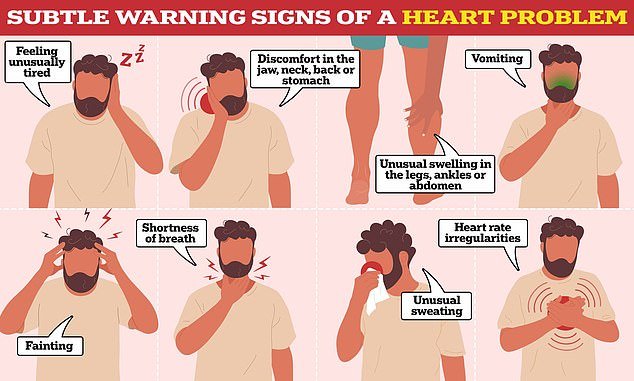It is the most vital muscle in the body and pumps oxygen and nutrients to all organs and tissues to keep you alive.
But if something is wrong with the heart, it can take years for the problems to be diagnosed.
Symptoms can be vague and many heart conditions are ‘hidden’, meaning they are not obvious from the outside.
Sindy Jodar, a senior cardiac nurse at the British Heart Foundation (BHF), warns that a condition is often not noticed until something goes wrong, or it is too late.
“That’s why it’s important to never ignore the signs of heart disease and get yourself checked just to be sure,” she says.
While some warning signs are easy to spot, such as severe chest pain, others are vaguer and harder to pinpoint.
Here, experts share some of the less obvious symptoms of heart disease.

While some warning signs (pictured) are easy to spot – such as severe chest pain – others are vaguer and harder to pinpoint
Feeling unusually tired
Dr. M Adil U Khan, GP at Pall Mall Medical, says you should not ‘ignore or downplay unusual levels of fatigue’.
While it’s normal to feel exhausted if you’ve been very busy or have had little sleep, he adds, “Feeling unusually tired, especially if it’s not related to exercise, should be investigated.”
It could be due to something like anemia, a virus or even related to mental health. It could also be related to your heart, so it’s important to get this checked out.
Subtle discomfort
“Pay attention to subtle discomfort in different parts of your body, including discomfort or pain in the jaw, neck, back, or stomach, which may be related to a heart problem,” says Dr. Khan.
If the symptoms are outside the norm for you and do not go away, it is always best to have them checked.
Unusual swelling
You may have noticed that your ankles look particularly swollen, or perhaps the area around your abdomen is constantly swollen for no apparent reason.
‘Unexplained swelling, known as edema, in the legs, ankles or abdomen, can also be signs of heart failure,’ explains Dr Khan.
Vomiting and a choking sensation
Sudden vomiting or a choking sensation in your throat is also something to watch out for.
‘While not every bout of nausea means something serious could happen, feeling sick combined with other aches and pains, such as severe chest pain, should set off alarm bells,’ says Ms Jodar.
Yes, it could be a stomach flu, but if you’re having more frequent bouts of vomiting and nausea and you’re not sure why, don’t wait too long to get things checked.
Pass out
If you suddenly faint, this is a big clue that something is wrong.
“If fainting or any other symptom becomes a problem, consult a healthcare provider and make an appointment with a doctor or cardiologist,” says Dr. Khan. ‘Discuss your complaints, medical history and risk factors with them.
‘Your healthcare provider will assess your vital signs and perform a physical examination.
‘Depending on your symptoms and risk factors, you may have diagnostic tests such as ECGs, echocardiograms, stress tests, blood tests or more specialized heart assessments.’
Shortness of breath
Struggling to catch your breath is not a trivial matter.
“Anyone who experiences shortness of breath during daily activities or at rest should consult their doctor,” says Dr. Khan.
This is especially true if it is accompanied by chest pain, even if it does not seem particularly severe.
Dr. Khan adds: ‘Mild chest discomfort should always be investigated, but some people confuse this with indigestion or muscle pain.’
Unusual sweating
“Feeling hot, clammy and quite sweaty when you haven’t done any strenuous exercise should not be ignored,” Ms Jodar adds.
‘If this is accompanied by chest pain, it is important that you get yourself examined.’
Irregularities in the heartbeat
Does your pulse sometimes feel jerky or too fast? Have it checked by your doctor.
Dr. Khan says: ‘Smartwatches and fitness trackers can provide valuable data about your heart rate and can detect irregularities to some extent. They can help monitor general trends in heart rate, especially during physical activity or rest.
‘However, they are not a substitute for medical quality monitoring and evaluation…
‘Any symptoms of concern should be assessed by a healthcare professional for a comprehensive assessment and diagnosis.’
